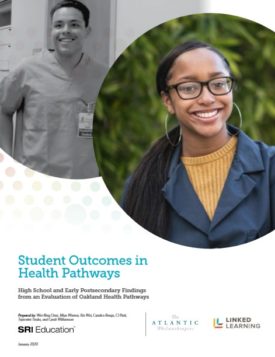Student Outcomes in Health Pathways: High School and Early Postsecondary Findings from an Evaluation of Oakland Health Pathways
Resource type: Research Report
SRI Education |
This brief presents findings from the Oakland Health Pathways Project (OHPP), a joint initiative of Oakland Unified School District, Alameda Health System, and Alameda County Health Care Services Agency. The initiative is designed to improve educational and long-term employment outcomes for youth of color in Oakland (Alameda County), California, while expanding and diversifying the local health care workforce. It applies Linked Learning, an approach to college and career preparation that combines classroom learning with real-world work experiences. This brief compares health pathway students’ outcomes with those of students who had similar demographic characteristics and prior achievement but were in two other programs of study: 1) traditional high school programs, and 2) other career-themed pathways. The study found health pathway students significantly outperformed traditional high school students on the high school course credits earned, high school graduation, college eligibility requirements met, and college enrollment. There were no differences in health pathway student outcomes in high school English Language Arts and math achievement, and dropout rates when compared to students in traditional high school programs and other career-themed pathways. In addition, health pathway students were no different in completion of college eligibility requirements and, among those who enrolled in college, were no more likely to enroll in a 4-year (rather than 2-year) college when compared to students in traditional high school programs and in other career-themed pathways.
Oakland Unified School District, Alameda Health System Foundation, and SRI International are Atlantic grantees. Atlantic commissioned this report.
